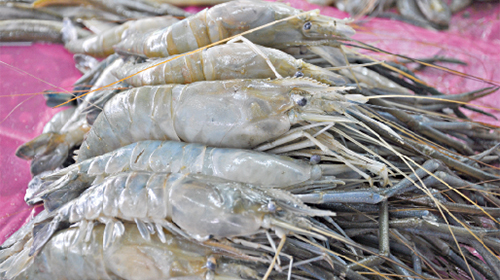News >> Business
Local shrimp exporters upbeat as US raises import duties on 5 countries
 15 Aug, 2013
15 Aug, 2013
Bangladeshi shrimp exporters on Wednesday expressed hope that they would be benefited because of imposition of additional duties on shrimp import by the US traders from four Asian countries, including India and Vietnam, and South American country Ecuador.
Bangladeshi exporters would be able to increase its export earnings through increase of price of shrimp while exporting to the US in coming months, they said.
They said the volume of Bangladesh’s shrimp export to the USA would also increase because of price hike of shrimp exported from those countries.
The US Commerce Department on Tuesday set final duties on billions of dollars of shrimp from four Asian countries — India, China, Vietnam, Malaysia — and Ecuador to offset foreign government subsidies, reports Reuters on Wednesday.
‘We hope that shrimp export to the US, in terms of both volume and foreign currency earnings, will increase because of additional duty imposition on shrimp import by the US government from those countries,’ Bangladesh Frozen Food Exporters Association president Md Amin Ullah told New Age on Wednesday.
Bangladesh’s exporters will be in advantage position in bargaining to increase price of shrimp as shrimp from other countries will be more costly due to new duty structure, he said adding that importers from the USA would also import more shrimp from Bangladesh because of the same reason.
According to Reuters report, the Coalition of Shrimp Industries, representing shrimp fishermen and processors in several southern US states had filed a petition last year asking the federal government for import relief.
The seven countries named in the case — Thailand, Indonesia, India, Ecuador, Vietnam, Malaysia and China — exported close to $3.4 billion worth of shrimp to the United States in 2012, making it one of the biggest cases in the department’s history.
That included $1.1 billion from Thailand, $634 million from Indonesia, $551 million from India, $500 million from Ecuador, $426 million from Vietnam, $142 million from Malaysia and $102 million from China.
Amin said that Bangladesh’s shrimp exports had been increasing on the international markets from last June as demand from the US and European countries increased because of production fall in some major exporting countries.
In the first month of the current financial year 2013–2014, overall shrimp export increased by 33.91 per cent from that of July 2012, according to Export Promotion Bureau data.
Shrimp exporters also exceeded its export target by 33.40 per cent in July as they exported shrimp worth $56.55 million against the target of $42.23 million for the month, the data showed.
In the last FY, shrimp export fell short of around $90 million because of price fluctuation on the international market, the exporters said. Bangladesh exported shrimp worth $454.43 million against the target of 545.23 million for the year.
Shrimp export to the US, however, has been experiencing a declining trend in the last few years as Bangladesh cannot compete with other counties due to lower price of shrimp produced by those countries though Bangladeshi shrimp, known as black tiger, is more tasty and large in size.
Another exporter said since June shrimp export in the USA had been increasing because of increased demand as shrimp production fell in other exporting countries.
In the FY 13, Bangladesh exported shrimp worth $35.71 million in the US market.
According to the Reuters report, Malaysia was hit with the highest final duties, ranging from 10.8 per cent to 54.5 per cent. China
received a final duty of 18.16 per cent and India from 5.54 per cent to 6.16 per cent. The Commerce Department set duties of 10.13 per cent to 13.51 per cent on shrimp imports from Ecuador and up to 7.88 per cent on imports from Vietnam.
The US, however, spared major suppliers Thailand and Indonesia from the import tax saying that the amount of government subsidies by the two countries were so low the department said no duties were warranted on shrimp imports.
Source: new age

